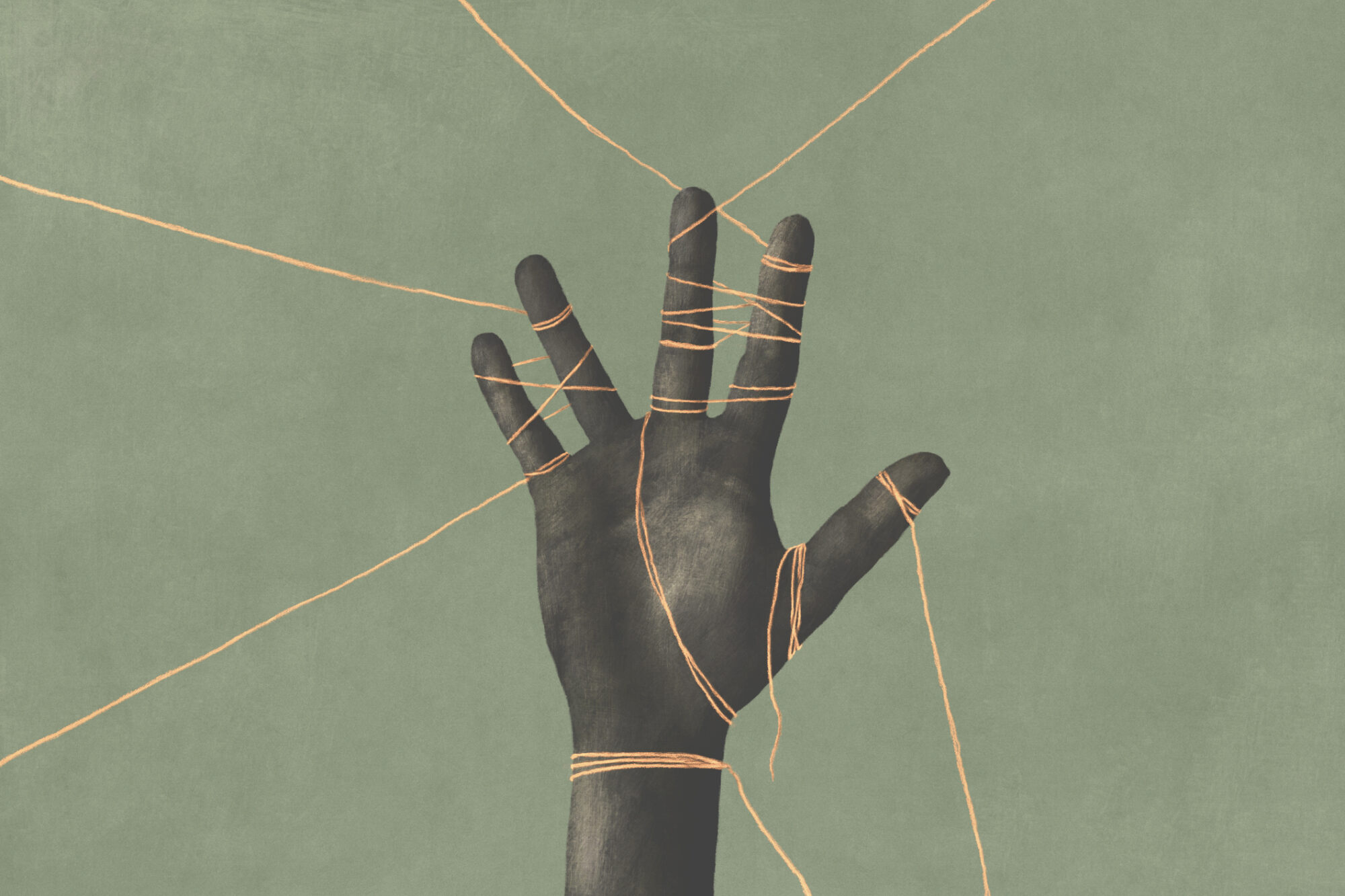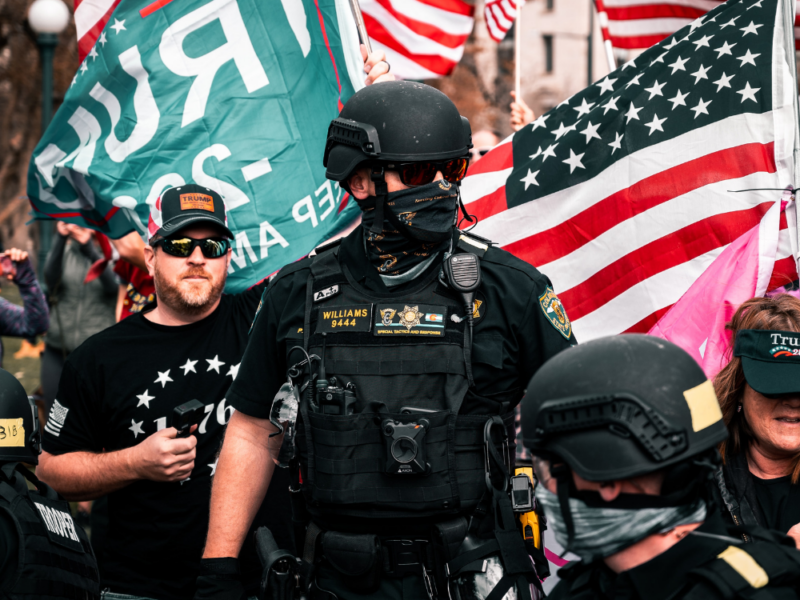I experienced time travel for the first time as a public school student in Cumberland County, North Carolina. I distinctly remember being enthralled each year by the American Civil War curriculum and then magically transported to World War II the next week. We would talk about how terrible fascism in Nazi Germany and Imperial Japan was, give three cheers for good old American spirit, and then move on to how Martin Luther King, Jr. did a really cool thing that everybody—except for, like, a few uncool dudes—totally wanted to happen. I know I'm not alone in that. For a lot of Americans, they were never thought to question that time-traveling odyssey.
But then Donald Trump showed up. And his third presidential campaign was full of people questioning who really has the right to vote and who really deserves full citizenship. A lot of us suddenly realized that we probably shouldn't let that guy back into the White House if we didn't want to go back to the era of poll taxes and paramilitaries. But we did. So here are a few lessons on surviving fascism from the time void known as Jim Crow.
Accept that this is happening. Denial won't change the outcome.
As the 1898 election season rolled around in North Carolina, the Democrats (who were the prominent white supremacist party of that era) began pushing a platform focused around defending white America from the monstrous spectre of "negro rule." They swore that elections were being stolen through fraud, that Black men were "Black beast rapists," that white women and children would never be safe if the Fusionist coalition of poor whites and newly enfranchised Black folks continued to hold elected positions in the state.
Sound familiar? I thought it might.
But back in 1898, people froze. Understandably. It was hard to accept that just over 30 years after the bloodiest conflict in the nation's history, the men the nation defeated in that war were willing to bring about extreme violence again and drag the country back to their "good ole days." But they were, dear reader. And they did. In November 1898, Confederates and sons of Confederates overthrew the government of Wilmington, North Carolina, murdered dozens of Black citizens (according to conservative accounts), and forced the state to capitulate to white supremacy. The difference between now and then is we have then to look back on. Don't freeze. Fight.
Let the hood cook.
As much as we quote W.E.B. DuBois and Frederick Douglass, my studies of the Jim Crow era have made me realize that we really don't give enough credit to the hood. Most Black people in the South in 1899 or 1912 weren't doing weekend book clubs to discuss the finer points of Black liberation theory. They were living it. They were forging rock-solid alliances through the crucible of illegal liquor, funky blues beats, and questionable liaisons they swore never happened after they had kids and turned Pentecostal. Ask your grandma. Watch how fast she tells you to shut up.
But seriously, while we needed the great minds and visionaries, the hood played defense long enough for those ideas to take root. And when it was finally time for Martin Luther King's well-dressed marchers to demonstrate for liberation, it was hard-drinking, knife-fighting, gun-toting, juke joint folks who made sure they were protected.
Hood is love. Hood is life. Hood is liberation.
Go to the boring fraternal meetings with your uncles and aunties.
Back in 1896, a German guy named Frederick Ludwig Hoffman released a document titled Race Traits and Tendencies of the American Negro (often called the "Extinction Thesis") in which he argued that Black people would eventually go extinct due to our alleged degeneracy. The study was funded by the Prudential Life Insurance Company after they realized they were paying out benefits to Black folks at twice the rate of white folks. They wanted an excuse to stop selling policies to us and Hoffman gave them one. Despite the lynchings, poor living conditions, and even poorer working conditions, Hoffman concluded that Black people just didn't have that dawg in 'em. But we did.
Remember the Elks Lodge you had your family reunion at? Or the old Black Shriners you saw at homecoming? When insurance companies used Hoffman's study as an excuse to deny Black folks medical and life benefits, it was the Black branches of organizations like the Benevolent and Protective Order of Elks and the Mystic Order of Shrine that formed mutual aid societies and worked to provide those services to members. Some, like the Knights and Daughters of Tabor, even served as refugee relocation services when white supremacists in Louisiana and Mississippi began an ethnic cleansing of Black people in the 1870s. As medical services and other benefits become more segregated (if you doubt this, please refer to bullet point #1), the old Black fraternal orders that thrived in the Jim Crow era can be an example for us once again under modern fascism.
Remember, we are international.
The very first whistleblower on the atrocities that took place in King Leopold's Congo Free State was a Black American named George Washington Williams. He wrote an open letter to Leopold letting him know, basically, that he wasn't worth a damn. Other Black Americans like William Henry Sheppard and even Booker T. Washington lobbied the McKinley and Roosevelt administrations to intervene in the atrocities and, despite enduring their own horrors regularly, everyday Black folks in the U.S. held meetings and raised funds to aid the movement.
Over 100 years later, the Democratic Republic of Congo (and Haiti and Sudan and…) still struggle with colonial oppression, while we're here in the belly of the beast, gearing up for a fight of our own. But we're more connected than ever. We can talk to each other in seconds. We can coordinate our actions. We can trade our skill sets. Being inside the empire makes our mission particularly challenging, yes, but it also gives us a unique opportunity to impact Black liberation on a global scale.
Go for the money.
The one thing that unifies Black American activism, from our enslaved ancestors to Jim Crow resistance fighters to modern movement workers, is the understanding of our value to the United States. Our enslaved ancestors understood that their bodies were currency and that stealing their own independence would weaken the slave empire enough to eventually break it. Our Jim Crow era ancestors understood the value of the strike (see: A. Phillip Randolph and the Brotherhood of Sleeping Car Porters) and the boycott (see: Montgomery Bus Boycott) as leverage in gaining Civil Rights.
We have just as much leverage as they do, if not more. Remember how dull TikTok was when the Black creators went on strike in 2021? That was just one app. Imagine if we brainstormed at the cookouts and clubs and then went to our little fraternal organizations and coordinated with our local networks and our international friends and… you see where I'm going with this? We could very well disrupt the cash flow these fascists need in order to be successful. Grab them by the coin purse, if you will.
At the end of the day, we don't know what the future will look like under this newest Trump (and Musk) regime. It's hard to say how opponents in the government will resist and how the people at large will respond once they learn what a tariff actually is. But more than anything, we have to accept that this is happening and that it's not new.
There are still elders among us who witnessed the America of the Jim Crow era. We've had far more time as a nation with white supremacist-focused government than without it. But that also means we've been given a plethora of battle-tested strategies for how to beat it. Hang in there, my time-traveling friends. We got this.


